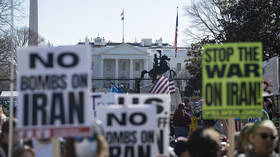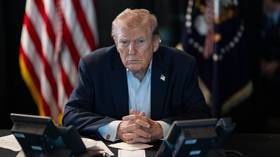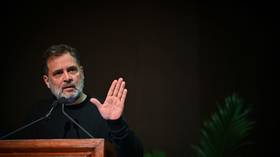ACTA action: Poland signs up to 'censorship' as 20,000 rage
After days of protests and hacker attacks, Poland has signed the controversial ACTA copyright protection treaty. Opponents call it an assault on online freedom, since it demands that internet service providers police user activity.
Warsaw’s Ambasador to Tokyo Jadwiga Rodowicz-Czechowska signed the Anti-Counterfeiting Trade Agreement in Japan on Tuesday. The treaty aims to harmonize international copyright protection standards in a number of industries from pharmaceutics to fashion.The agreement now has to be ratified by the parliament, which is unlikely to oppose it, reports RT’s Aleksey Yaroshevsky.The news came amid mass protests in Poland, where tens of thousands of people took to the streets, while many more joined online action against ACTA. Some 15,000 activists marched in Krakow, 5,000 in Wroclaw, and several thousand in other Polish cities.A number of websites, including that of Prime Minister Donald Tusk were attacked by hackers demanding that the country boycott the treaty. This however didn’t stop the authorities from proceeding with their plan.The agreement, which has already been signed by the US, Australia, Canada, Japan, Morocco, New Zealand, Singapore and South Korea, has been criticized by human rights groups for the secrecy, in which it has been developed, and the potential for abuse it poses.The deal has been compared to the SOPA/PIPA bills, which drew worldwide opposition and an internet strike, once the danger the posed became widely publicized. It the case of ACTA, the public remained mostly unaware of its nature, before the hacktivist group Anonymous spread the message.The Anonymous group has sent out a stern warning, saying that it has very sensitive information about the Polish authorities and will publish it, unless the parliament decides to vote against ACTA."Polish government – we are more powerful than you. We have a lot of your files and personal information. We warn you to exercise caution," the statement published on pastebin.com says.Under ACTA, internet service providers are virtually obliged to monitor all user activity for possible copyright violations. It also gives trademark owners and officers of the law great authority to violate privacy while investigating suspected infringements.Apart from affecting internet use, the agreement puts great restrictions on other areas involving patents, like the production of generic drugs.
Rick Falkvinge, the founder of the Swedish Pirate Party, told RT that the ACTA copyright protection treaty is an “excellent example of abuse of power by the corporate industry.”“This legislation about putting people in jail was negotiated by corporations and the lawmakers just got it in their lap,” he explained. “That is not how a democratic society should work, quite regardless of what this law says.”Falkvinge believes that activists can influence lawmaking, and that the movement against SOPA and PIPA in the US once again proved that.“Millions of people, literally millions contacted Congress and said ‘we don’t want this, this is not what we stand for,’” he said. “Congress heard them and realized that if they follow the corporations rather then the voters, then they’ll loose their jobs. And that is what changes policy in the end.”
ACTA is a classic example of politicians dodging the real issues, said Polish rights activist Katarzyna Szymielewicz to RT in an interview.“Politicians avoid talking about reforming intellectual property law. Instead they choose to strengthen the enforcement measures.” She then went on to say that a very unclear legal landscape and a widespread ignorance concerning intellectual property laws is what causes these violent reactions.“If we see finally a complex deep reform of intellectual property law in the whole European Union and beyond we might see the problem of piracy come to an end.” She concluded that the issue of intellectual property law could easily be solved by an overhaul of legislation, thus avoiding more enforcement laws.














